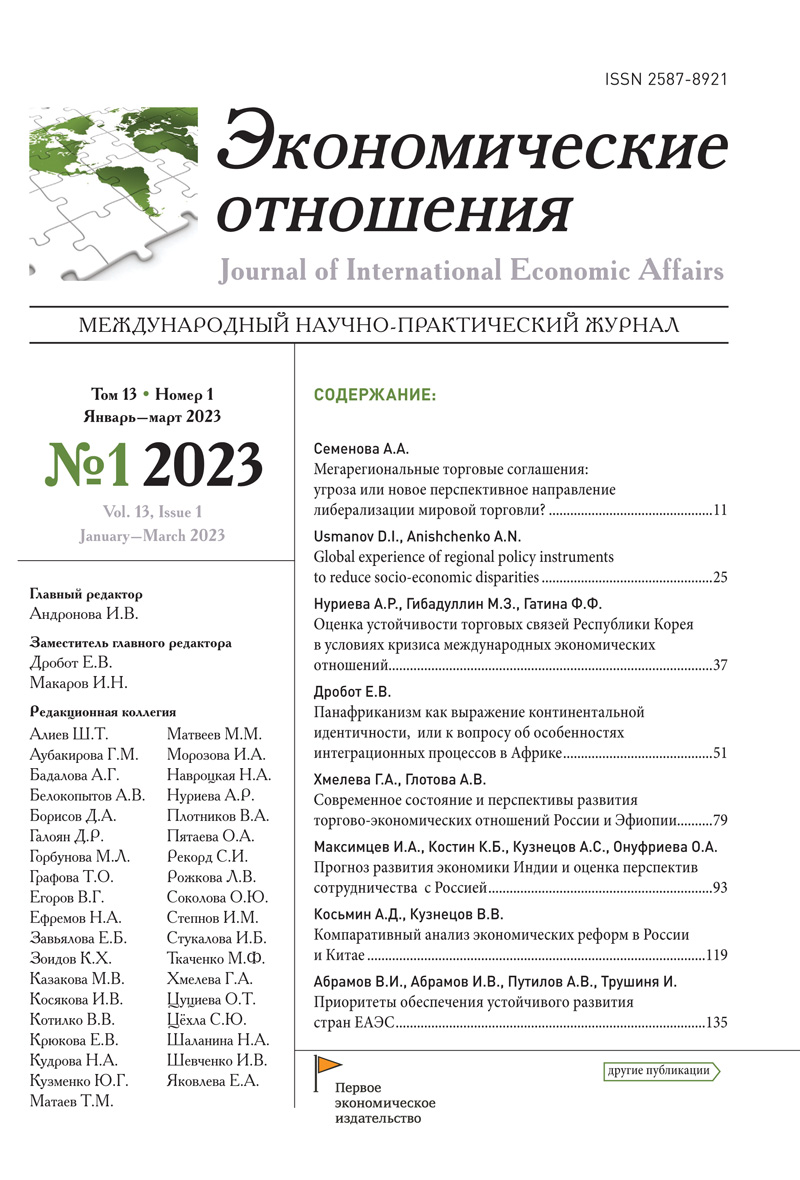Global experience of regional policy instruments to reduce socio-economic disparities
- Authors: Usmanov D.I.1,2, Anishchenko A.N.1
-
Affiliations:
- Market Economy Institute of Russian Academy of Sciences (MEI RAS)
- Financial University under the Government of the Russian Federation, Department of Management
- Issue: Vol 13, No 1 (2023)
- Pages: 25-36
- Section: Articles
- URL: https://journals.eco-vector.com/2587-8921/article/view/607526
- DOI: https://doi.org/10.18334/eo.13.1.117360
- ID: 607526
Cite item
Abstract
The article systematises the global experience of implementing regional policy instruments aimed at reducing disparities in the levels of socio-economic development. The experience of the EAEU member states, the EU, the WTO, etc. has been studied. It has been revealed that financial instruments are mainly used to: accelerate economic growth of lagging regions within the countries; improve the tax system (reduction of tax rates for citizens with lower nominal incomes by increasing the rates of the wealthiest citizens); attract investment; realize production potential; improve social and housing conditions of the population; provide employment, etc. The effectiveness of such measures in many member states of integration alliances is quite high. It has been noted that non-financial instruments to stimulate economic growth and reduce existing disparities in the levels of socio-economic development are also significant and relevant.FUNDING:The article was prepared within the framework of the state task of the MEI RAS: the research topic «Modeling of the processes of ensuring sustainable and balanced socio-economic and spatial development of Russia and neighboring countries in order to form a Large Eurasian partnership»; the research topic «Institutional transformation of economic security in solving socio-economic problems of sustainable development of the national economy of Russia».
About the authors
Daler Irmatovich Usmanov
Market Economy Institute of Russian Academy of Sciences (MEI RAS); Financial University under the Government of the Russian Federation, Department of Management
Author for correspondence.
Email: us.dali@mail.ru
Alesya Nikolaevna Anishchenko
Market Economy Institute of Russian Academy of Sciences (MEI RAS)
Email: anishchenko-an@mail.ru
References
- Аткинсон Э.Б. Неравенство: как с ним быть?. / Э.Б. Аткинсон; пер. с англ. О. Левченко; под науч. Ред. М. Добряковой. - Москва: Изд. Дом «Дело» РАНХ и ГС, 2018. – 536 c.
- Агийон Ф., Уильямсон, Д. Экономический рост, неравенство и глобализация: теория, история и политическая практика. - Москва: Изд. Дом «Дело» РАНХ и ГС, 2015. – 288 c.
- Гимпельсон В.Е., Монусова Г.А. Восприятие неравенства и социальная мобильность // Экономический журнал ВШЭ. – 2014. – № 2. – c. 216-248.
- Гуриев С. Доклад ЕБРР о переходном процессе 2016–17 «Переход к рыночной экономике для всех: равные возможности в мире неравенства». [Электронный ресурс]. URL: https://www.nes.ru/dataupload/files/news/TR16_Rus_v4_translated_Guriev.pdf (дата обращения: 12.03.2020).
- Доклад о неравенстве в мире 2018 (Основные положения). Лаборатория неравенства в мире (World Inequality Lab). [Электронный ресурс]. URL: https://wir2018.wid.world (дата обращения: 10.01.2023).
- Миланович Б. Глобальное неравенство. Новый подход для эпохи глобализации. - Москва: Институт Гайдара, 2017. – 336 c.
- Пикетти Т. Капитал в XXI веке. / пер. с фр. А.Л. Дунаев, науч. ред. пер. А.Ю. Володин. - М.: Ад Маргинем Пресс, 2015. – 592 c.
- Стиглиц Д. Великое разделение. Неравенство в обществе или что делать оставшимся 99 % населения?. - Москва: Эксмо, 2016. – 480 c.
- Сен А. Идея справедливости. - Москва: Изд–во Института Гайдара; Фонд «Либеральная Миссия», 2016. – 520 c.
- Сен А. Возвращение к проблеме неравенства. - Москва: Наука, 1996. – 160 c.
- Усманов Д.И. Оценка влияния факторов глобализации на экономическое неравенство регионов России. / дис. канд. экон. наук: 08.00.05. - Белгород, 2015. – 214 c.
- Усманов Д. И. Особенности институционального регулирования тенденций развития мирового рынка продовольствия в условиях социально-экономического неравенства // European Social Science Journal. – 2014. – № 6. – c. 492-496.
- Böhme K. Territorial evidence supporting policy-making in Europe: How ESPON came, saw and conquered // DISP-The Planning Review. – 2016. – № 52 (2). – p. 62-67.
- Fujita M., Krugman P., Venables A. J. The spatial economy: cities, regions, and international trade. - Cambridge, Massachusetts: The MIT Press, 1999. – 367 p.
- Чистобаев А.И., Федулова С.И. Опыт пространственного планирования в Европейском союзе и возможности его использования в России // Балтийский регион. – 2018. – № 2. – c. 86-99.
- Kahila-Tani M., Broberg A., Kytta M., Tyger T. et al. Let the Citizens Map-Public Participation GIS as a Planning Support System in the Helsinki Master Plan Process // Planning Practice Research. – 2016. – № 31(2). – p. 195-214.
Supplementary files









